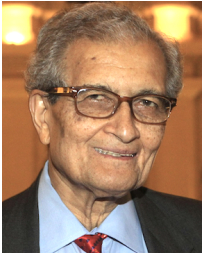On this date in 1933, Nobel laureate Amartya Kumar Sen, a giant of development economics, was born in Shantiniketan, Bengal, British India. Sen is considered to be a pioneer in several fields of economics, particularly social welfare, gender equity and famine studies. His father was a chemistry professor, and his mother was the daughter of an eminent Sanskritist and scholar.
Sen was educated at an institution founded by freedom fighter, educator and Nobel Prize-winner Rabindranath Tagore, who was responsible for Sen’s first name Amartya, which means immortal or heavenly. Sen helped distribute food relief with his family during the Bengal famine of the 1940s that killed millions. The famine steeled his resolve to work to ensure that such a cataclysm never reoccurred.
He went on to receive a Ph.D. from Cambridge University and has taught at Oxford, Harvard, UC-Berkeley and premier Indian campuses. Sen’s wide-ranging contributions to economics include introducing the notion of human capabilities and championing policies to expand such capabilities. He was a key figure in setting up the U.N.’s Human Development Report to assess how nations meet their populations’ needs.
Sen wrote a groundbreaking study on how 100 million “missing” women (particularly in Asia) are affected by discriminatory gender policies leading to a staggering number of premature deaths. He was awarded the 1998 Nobel Prize in Economics for “his contributions to welfare economics … tied closely together by a general interest in distributional issues and a particular interest in the most impoverished members of society.”
He has staunchly defended the secular foundations of independent India and sharply criticized the Hindu nationalist government, which has gotten him into trouble. He describes himself as an atheist proud to belong to the freethinking tradition within Hinduism. When asked at the Calcutta Press Club if he believed in a god, he replied, “No. I do not believe in god.” (Rediff, Dec. 28, 1998)
Sen and his first wife Nabaneeta Dev, a writer and scholar, wed in 1958. They had two daughters: Antara, a journalist, and Nandana, a Bollywood actress. In 1978 he married Eva Colorni, an Italian economist. They had a daughter, Indrani, a journalist in New York, and a son, Kabir, a hip hop artist and music teacher in Cambridge, Mass. After Eva died of cancer, he married Emma Georgina Rothschild, a Harvard history professor.
Sen has received over 90 honorary degrees from universities around the world.
PHOTO: Sen in 2012 at Fronteiras do Pensamento (Frontiers of Thought) in São Paulo, a cultural project to bring international speakers to Brazil to address contemporary issues. CC 2.0


